Using Numeracy and ICT Skills in Research: A Detailed Analysis
VerifiedAdded on 2023/06/08
|5
|1450
|312
Essay
AI Summary
This essay provides a detailed exploration of research, its nature, and the principles that govern its organization. It emphasizes the importance of numeracy and ICT skills in conducting effective research. The essay defines research as a systematic inquiry involving inductive and deductive methods to describe, explain, predict, and control observed phenomena. Key characteristics of research, such as being systematic, controlled, empirical, objective, and ensuring validity and reliability, are discussed. Furthermore, the ethical principles of organizing research, including reducing the risk of harm, obtaining informed consent, respecting the right to withdraw, avoiding deceptive tactics, and ensuring independent review, are thoroughly examined. The essay concludes by highlighting the structured approach of research in finding solutions to defined questions while adhering to ethical guidelines.
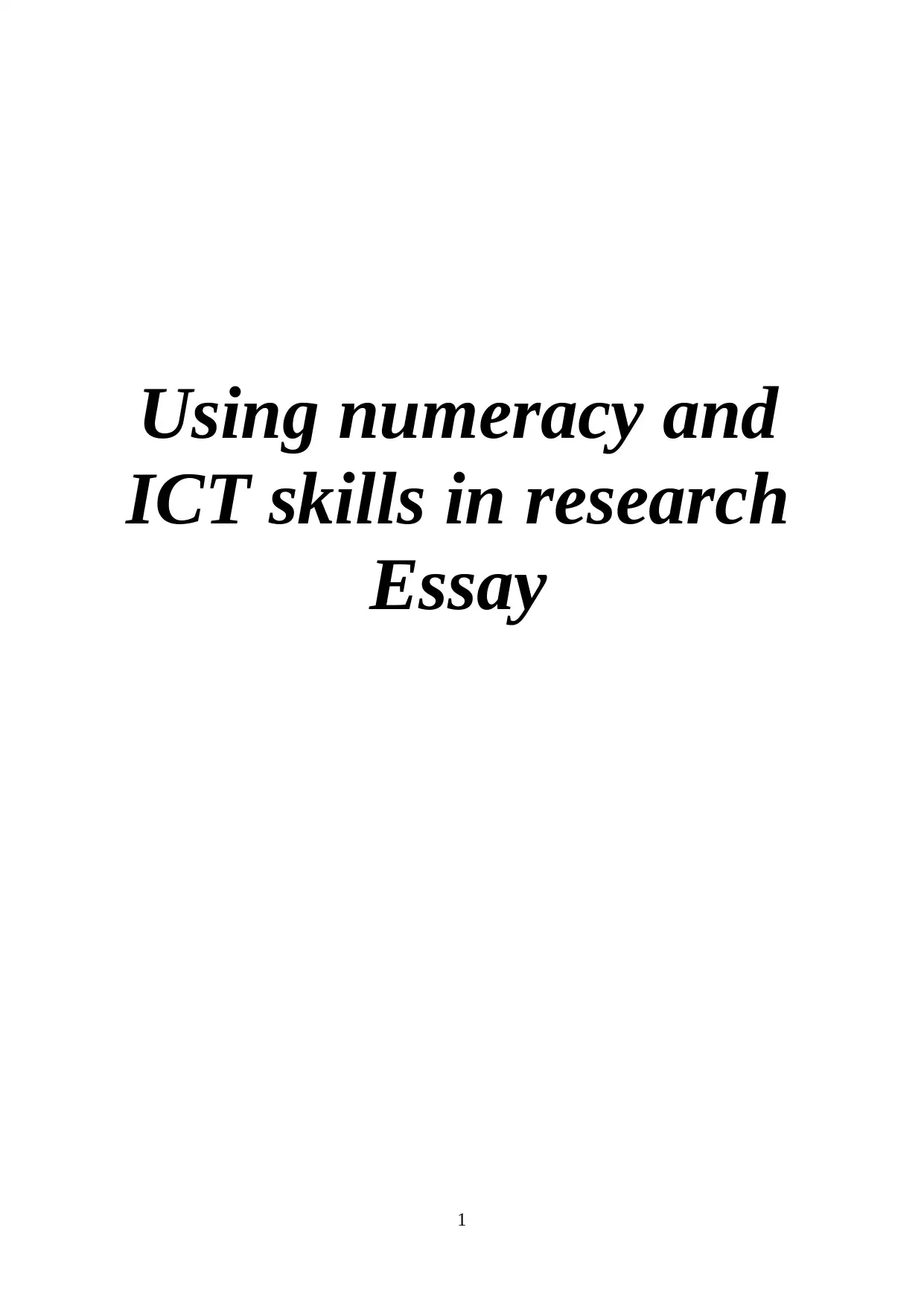
Using numeracy and
ICT skills in research
Essay
1
ICT skills in research
Essay
1
Paraphrase This Document
Need a fresh take? Get an instant paraphrase of this document with our AI Paraphraser
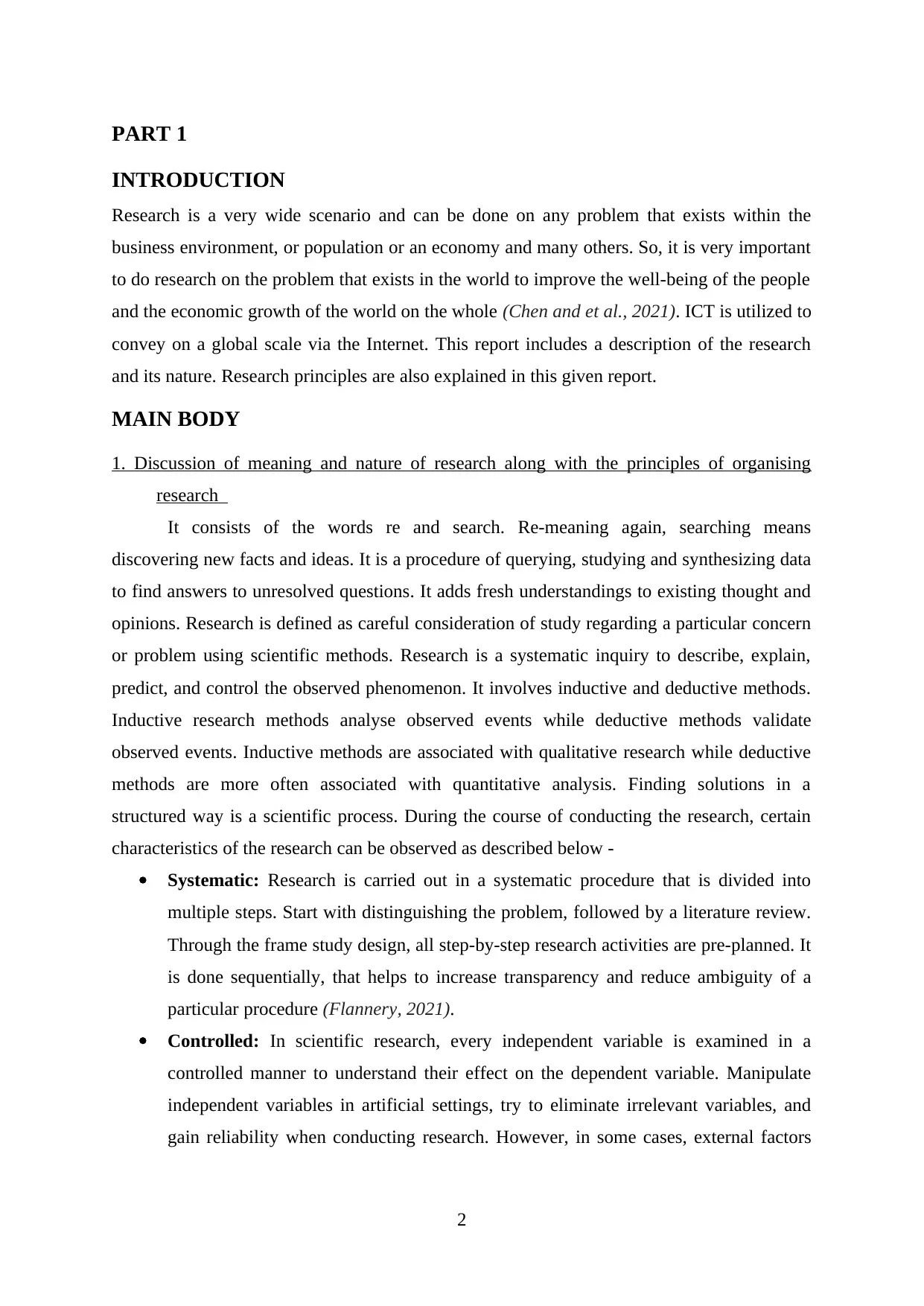
PART 1
INTRODUCTION
Research is a very wide scenario and can be done on any problem that exists within the
business environment, or population or an economy and many others. So, it is very important
to do research on the problem that exists in the world to improve the well-being of the people
and the economic growth of the world on the whole (Chen and et al., 2021). ICT is utilized to
convey on a global scale via the Internet. This report includes a description of the research
and its nature. Research principles are also explained in this given report.
MAIN BODY
1. Discussion of meaning and nature of research along with the principles of organising
research
It consists of the words re and search. Re-meaning again, searching means
discovering new facts and ideas. It is a procedure of querying, studying and synthesizing data
to find answers to unresolved questions. It adds fresh understandings to existing thought and
opinions. Research is defined as careful consideration of study regarding a particular concern
or problem using scientific methods. Research is a systematic inquiry to describe, explain,
predict, and control the observed phenomenon. It involves inductive and deductive methods.
Inductive research methods analyse observed events while deductive methods validate
observed events. Inductive methods are associated with qualitative research while deductive
methods are more often associated with quantitative analysis. Finding solutions in a
structured way is a scientific process. During the course of conducting the research, certain
characteristics of the research can be observed as described below -
Systematic: Research is carried out in a systematic procedure that is divided into
multiple steps. Start with distinguishing the problem, followed by a literature review.
Through the frame study design, all step-by-step research activities are pre-planned. It
is done sequentially, that helps to increase transparency and reduce ambiguity of a
particular procedure (Flannery, 2021).
Controlled: In scientific research, every independent variable is examined in a
controlled manner to understand their effect on the dependent variable. Manipulate
independent variables in artificial settings, try to eliminate irrelevant variables, and
gain reliability when conducting research. However, in some cases, external factors
2
INTRODUCTION
Research is a very wide scenario and can be done on any problem that exists within the
business environment, or population or an economy and many others. So, it is very important
to do research on the problem that exists in the world to improve the well-being of the people
and the economic growth of the world on the whole (Chen and et al., 2021). ICT is utilized to
convey on a global scale via the Internet. This report includes a description of the research
and its nature. Research principles are also explained in this given report.
MAIN BODY
1. Discussion of meaning and nature of research along with the principles of organising
research
It consists of the words re and search. Re-meaning again, searching means
discovering new facts and ideas. It is a procedure of querying, studying and synthesizing data
to find answers to unresolved questions. It adds fresh understandings to existing thought and
opinions. Research is defined as careful consideration of study regarding a particular concern
or problem using scientific methods. Research is a systematic inquiry to describe, explain,
predict, and control the observed phenomenon. It involves inductive and deductive methods.
Inductive research methods analyse observed events while deductive methods validate
observed events. Inductive methods are associated with qualitative research while deductive
methods are more often associated with quantitative analysis. Finding solutions in a
structured way is a scientific process. During the course of conducting the research, certain
characteristics of the research can be observed as described below -
Systematic: Research is carried out in a systematic procedure that is divided into
multiple steps. Start with distinguishing the problem, followed by a literature review.
Through the frame study design, all step-by-step research activities are pre-planned. It
is done sequentially, that helps to increase transparency and reduce ambiguity of a
particular procedure (Flannery, 2021).
Controlled: In scientific research, every independent variable is examined in a
controlled manner to understand their effect on the dependent variable. Manipulate
independent variables in artificial settings, try to eliminate irrelevant variables, and
gain reliability when conducting research. However, in some cases, external factors
2
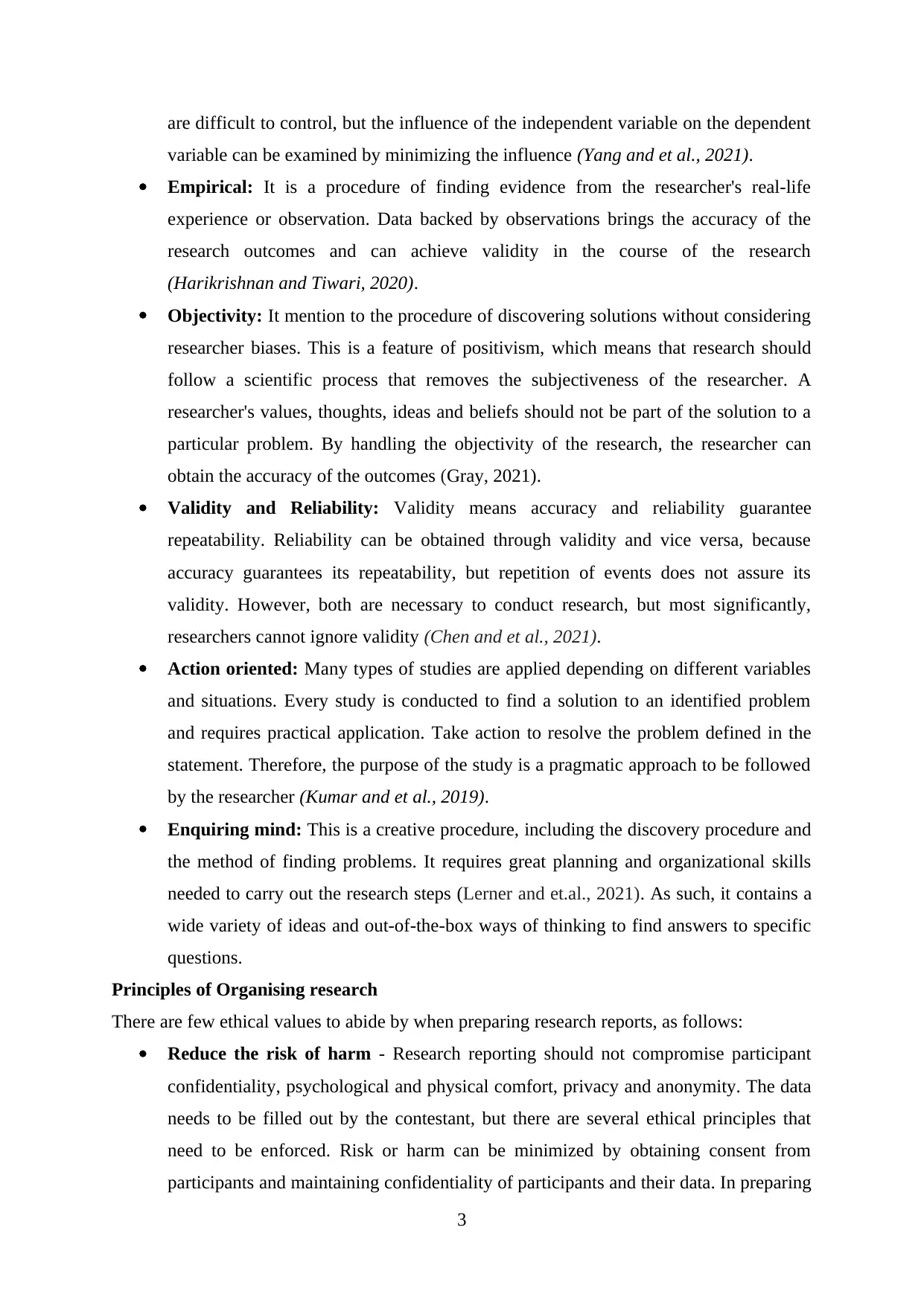
are difficult to control, but the influence of the independent variable on the dependent
variable can be examined by minimizing the influence (Yang and et al., 2021).
Empirical: It is a procedure of finding evidence from the researcher's real-life
experience or observation. Data backed by observations brings the accuracy of the
research outcomes and can achieve validity in the course of the research
(Harikrishnan and Tiwari, 2020).
Objectivity: It mention to the procedure of discovering solutions without considering
researcher biases. This is a feature of positivism, which means that research should
follow a scientific process that removes the subjectiveness of the researcher. A
researcher's values, thoughts, ideas and beliefs should not be part of the solution to a
particular problem. By handling the objectivity of the research, the researcher can
obtain the accuracy of the outcomes (Gray, 2021).
Validity and Reliability: Validity means accuracy and reliability guarantee
repeatability. Reliability can be obtained through validity and vice versa, because
accuracy guarantees its repeatability, but repetition of events does not assure its
validity. However, both are necessary to conduct research, but most significantly,
researchers cannot ignore validity (Chen and et al., 2021).
Action oriented: Many types of studies are applied depending on different variables
and situations. Every study is conducted to find a solution to an identified problem
and requires practical application. Take action to resolve the problem defined in the
statement. Therefore, the purpose of the study is a pragmatic approach to be followed
by the researcher (Kumar and et al., 2019).
Enquiring mind: This is a creative procedure, including the discovery procedure and
the method of finding problems. It requires great planning and organizational skills
needed to carry out the research steps (Lerner and et.al., 2021). As such, it contains a
wide variety of ideas and out-of-the-box ways of thinking to find answers to specific
questions.
Principles of Organising research
There are few ethical values to abide by when preparing research reports, as follows:
Reduce the risk of harm - Research reporting should not compromise participant
confidentiality, psychological and physical comfort, privacy and anonymity. The data
needs to be filled out by the contestant, but there are several ethical principles that
need to be enforced. Risk or harm can be minimized by obtaining consent from
participants and maintaining confidentiality of participants and their data. In preparing
3
variable can be examined by minimizing the influence (Yang and et al., 2021).
Empirical: It is a procedure of finding evidence from the researcher's real-life
experience or observation. Data backed by observations brings the accuracy of the
research outcomes and can achieve validity in the course of the research
(Harikrishnan and Tiwari, 2020).
Objectivity: It mention to the procedure of discovering solutions without considering
researcher biases. This is a feature of positivism, which means that research should
follow a scientific process that removes the subjectiveness of the researcher. A
researcher's values, thoughts, ideas and beliefs should not be part of the solution to a
particular problem. By handling the objectivity of the research, the researcher can
obtain the accuracy of the outcomes (Gray, 2021).
Validity and Reliability: Validity means accuracy and reliability guarantee
repeatability. Reliability can be obtained through validity and vice versa, because
accuracy guarantees its repeatability, but repetition of events does not assure its
validity. However, both are necessary to conduct research, but most significantly,
researchers cannot ignore validity (Chen and et al., 2021).
Action oriented: Many types of studies are applied depending on different variables
and situations. Every study is conducted to find a solution to an identified problem
and requires practical application. Take action to resolve the problem defined in the
statement. Therefore, the purpose of the study is a pragmatic approach to be followed
by the researcher (Kumar and et al., 2019).
Enquiring mind: This is a creative procedure, including the discovery procedure and
the method of finding problems. It requires great planning and organizational skills
needed to carry out the research steps (Lerner and et.al., 2021). As such, it contains a
wide variety of ideas and out-of-the-box ways of thinking to find answers to specific
questions.
Principles of Organising research
There are few ethical values to abide by when preparing research reports, as follows:
Reduce the risk of harm - Research reporting should not compromise participant
confidentiality, psychological and physical comfort, privacy and anonymity. The data
needs to be filled out by the contestant, but there are several ethical principles that
need to be enforced. Risk or harm can be minimized by obtaining consent from
participants and maintaining confidentiality of participants and their data. In preparing
3
⊘ This is a preview!⊘
Do you want full access?
Subscribe today to unlock all pages.

Trusted by 1+ million students worldwide
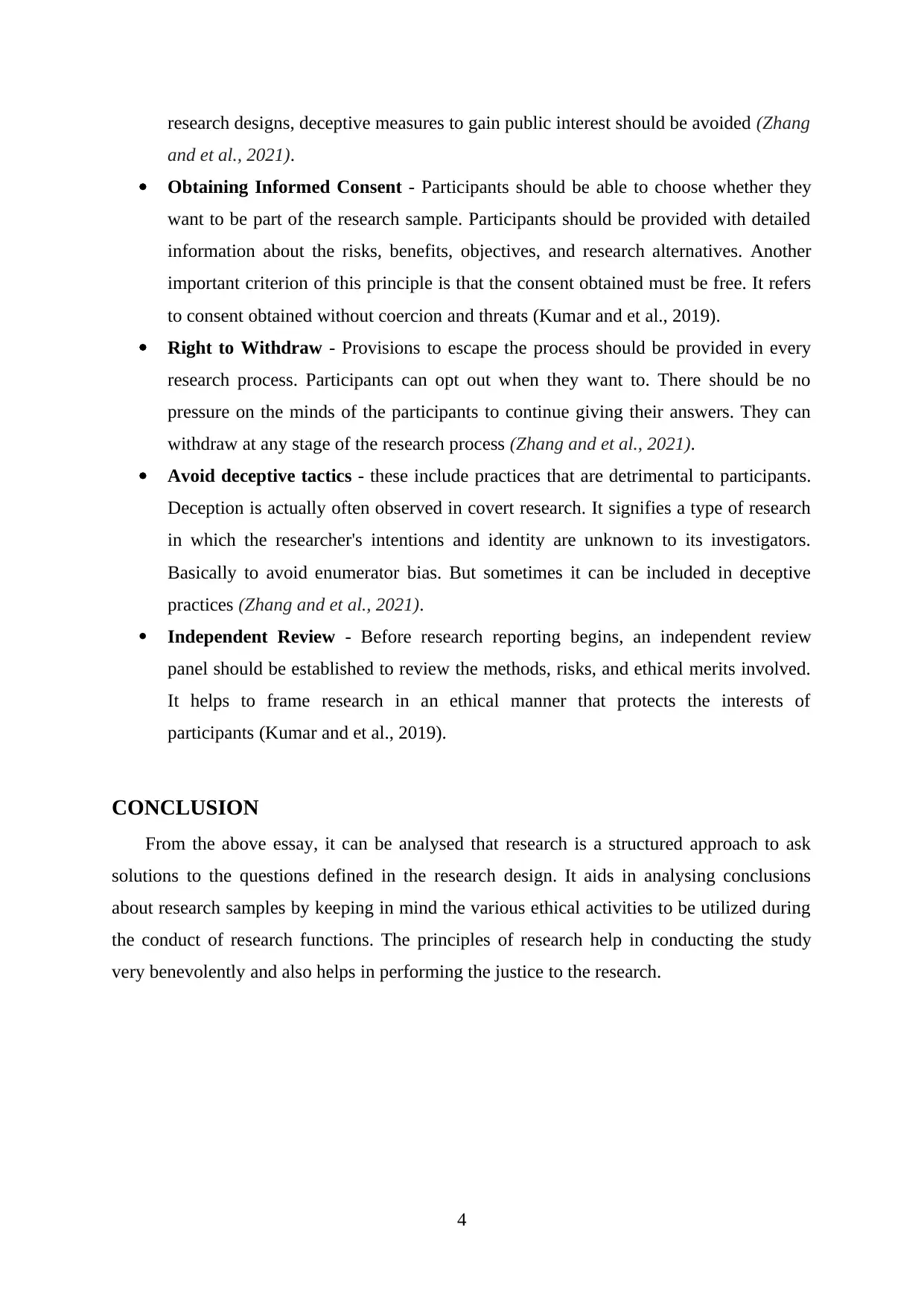
research designs, deceptive measures to gain public interest should be avoided (Zhang
and et al., 2021).
Obtaining Informed Consent - Participants should be able to choose whether they
want to be part of the research sample. Participants should be provided with detailed
information about the risks, benefits, objectives, and research alternatives. Another
important criterion of this principle is that the consent obtained must be free. It refers
to consent obtained without coercion and threats (Kumar and et al., 2019).
Right to Withdraw - Provisions to escape the process should be provided in every
research process. Participants can opt out when they want to. There should be no
pressure on the minds of the participants to continue giving their answers. They can
withdraw at any stage of the research process (Zhang and et al., 2021).
Avoid deceptive tactics - these include practices that are detrimental to participants.
Deception is actually often observed in covert research. It signifies a type of research
in which the researcher's intentions and identity are unknown to its investigators.
Basically to avoid enumerator bias. But sometimes it can be included in deceptive
practices (Zhang and et al., 2021).
Independent Review - Before research reporting begins, an independent review
panel should be established to review the methods, risks, and ethical merits involved.
It helps to frame research in an ethical manner that protects the interests of
participants (Kumar and et al., 2019).
CONCLUSION
From the above essay, it can be analysed that research is a structured approach to ask
solutions to the questions defined in the research design. It aids in analysing conclusions
about research samples by keeping in mind the various ethical activities to be utilized during
the conduct of research functions. The principles of research help in conducting the study
very benevolently and also helps in performing the justice to the research.
4
and et al., 2021).
Obtaining Informed Consent - Participants should be able to choose whether they
want to be part of the research sample. Participants should be provided with detailed
information about the risks, benefits, objectives, and research alternatives. Another
important criterion of this principle is that the consent obtained must be free. It refers
to consent obtained without coercion and threats (Kumar and et al., 2019).
Right to Withdraw - Provisions to escape the process should be provided in every
research process. Participants can opt out when they want to. There should be no
pressure on the minds of the participants to continue giving their answers. They can
withdraw at any stage of the research process (Zhang and et al., 2021).
Avoid deceptive tactics - these include practices that are detrimental to participants.
Deception is actually often observed in covert research. It signifies a type of research
in which the researcher's intentions and identity are unknown to its investigators.
Basically to avoid enumerator bias. But sometimes it can be included in deceptive
practices (Zhang and et al., 2021).
Independent Review - Before research reporting begins, an independent review
panel should be established to review the methods, risks, and ethical merits involved.
It helps to frame research in an ethical manner that protects the interests of
participants (Kumar and et al., 2019).
CONCLUSION
From the above essay, it can be analysed that research is a structured approach to ask
solutions to the questions defined in the research design. It aids in analysing conclusions
about research samples by keeping in mind the various ethical activities to be utilized during
the conduct of research functions. The principles of research help in conducting the study
very benevolently and also helps in performing the justice to the research.
4
Paraphrase This Document
Need a fresh take? Get an instant paraphrase of this document with our AI Paraphraser
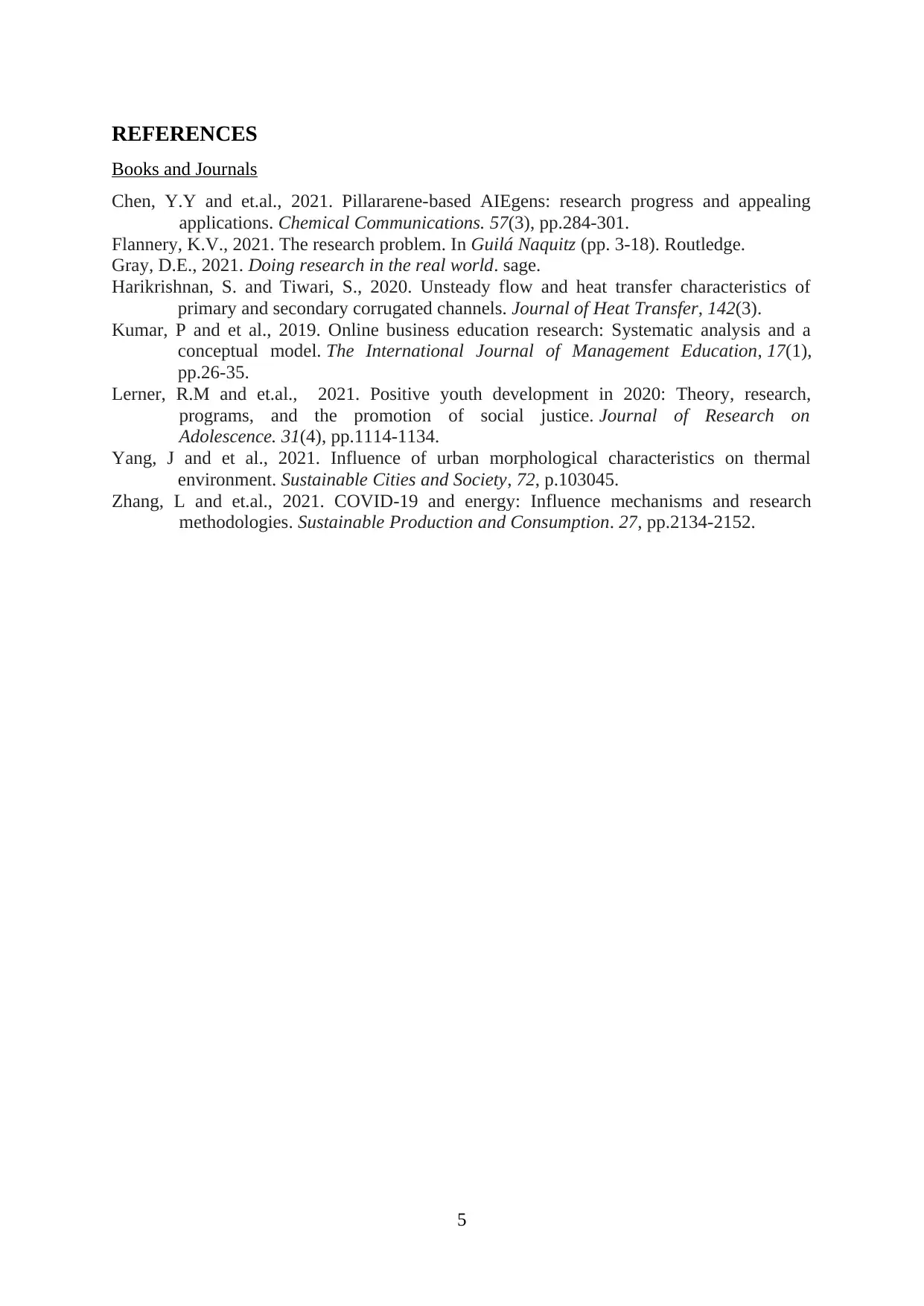
REFERENCES
Books and Journals
Chen, Y.Y and et.al., 2021. Pillararene-based AIEgens: research progress and appealing
applications. Chemical Communications. 57(3), pp.284-301.
Flannery, K.V., 2021. The research problem. In Guilá Naquitz (pp. 3-18). Routledge.
Gray, D.E., 2021. Doing research in the real world. sage.
Harikrishnan, S. and Tiwari, S., 2020. Unsteady flow and heat transfer characteristics of
primary and secondary corrugated channels. Journal of Heat Transfer, 142(3).
Kumar, P and et al., 2019. Online business education research: Systematic analysis and a
conceptual model. The International Journal of Management Education, 17(1),
pp.26-35.
Lerner, R.M and et.al., 2021. Positive youth development in 2020: Theory, research,
programs, and the promotion of social justice. Journal of Research on
Adolescence. 31(4), pp.1114-1134.
Yang, J and et al., 2021. Influence of urban morphological characteristics on thermal
environment. Sustainable Cities and Society, 72, p.103045.
Zhang, L and et.al., 2021. COVID-19 and energy: Influence mechanisms and research
methodologies. Sustainable Production and Consumption. 27, pp.2134-2152.
5
Books and Journals
Chen, Y.Y and et.al., 2021. Pillararene-based AIEgens: research progress and appealing
applications. Chemical Communications. 57(3), pp.284-301.
Flannery, K.V., 2021. The research problem. In Guilá Naquitz (pp. 3-18). Routledge.
Gray, D.E., 2021. Doing research in the real world. sage.
Harikrishnan, S. and Tiwari, S., 2020. Unsteady flow and heat transfer characteristics of
primary and secondary corrugated channels. Journal of Heat Transfer, 142(3).
Kumar, P and et al., 2019. Online business education research: Systematic analysis and a
conceptual model. The International Journal of Management Education, 17(1),
pp.26-35.
Lerner, R.M and et.al., 2021. Positive youth development in 2020: Theory, research,
programs, and the promotion of social justice. Journal of Research on
Adolescence. 31(4), pp.1114-1134.
Yang, J and et al., 2021. Influence of urban morphological characteristics on thermal
environment. Sustainable Cities and Society, 72, p.103045.
Zhang, L and et.al., 2021. COVID-19 and energy: Influence mechanisms and research
methodologies. Sustainable Production and Consumption. 27, pp.2134-2152.
5
1 out of 5
Related Documents
Your All-in-One AI-Powered Toolkit for Academic Success.
+13062052269
info@desklib.com
Available 24*7 on WhatsApp / Email
![[object Object]](/_next/static/media/star-bottom.7253800d.svg)
Unlock your academic potential
Copyright © 2020–2026 A2Z Services. All Rights Reserved. Developed and managed by ZUCOL.



